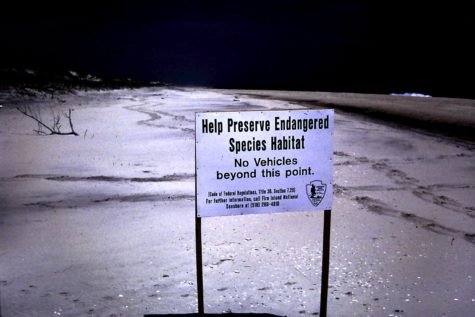By Jaime Franchie The piping plover, a federally-listed, threatened and endangered bird species on Long Island, is the catalyst for controversial driving restrictions on Smith Point beach this summer season.The piping plover is a small and stocky migratory bird that makes its home along Long Island’s shoreline. The Fire Island National Seashore has implemented an annual piping plover monitoring and protection program beginning in March and running through Labor Day. This program calls for restrictions on driving, pets and kites.The controversy stems from last year’s season when drivers who had purchased 4-wheel drive permits to Smith Point’s outer beach were unable to gain access to the beach for two months of the season, despite having paid for the entire summer.Regarding the outer beach by Smith Point, according to the Suffolk County Park Commission, “Weather and beach conditions permitting, the Parks Department allows day and night fishing, camping (in-season) and day trips for patrons with a properly permitted 4-wheel drive vehicle.”Symbolic fencing with orange flags marks specified parts of the shore in order to protect the courting and nesting areas of the piping plovers. The fencing helps to keep vehicles and foot traffic from disturbing this important step in their repopulation. By mid-August, the plovers will have flown South for the winter, and restrictions on kites and pets will be lifted.Congressman Lee Zeldin (R-NY-1) issued a statement May 4 stating that although he has vocally supported revising the current plan to be more accommodating to beach goers, Suffolk County Executive Steve Bellone has not acted. Zeldin penned a letter to Bellone this February urging him to consider alternative options before the high season began.“The residents of Suffolk County who enjoy Smith Point during the summer season deserve the beach access they paid for through off-road vehicle permits, and Smith Point deserves the same flexibility with regards to piping plover management afforded to beaches in Cape Cod National Seashore and currently being planned for Robert Moses State Park,” the letter reads. Zeldin continues by urging the county to file the necessary paperwork to maintain a more flexible plan to move the birds so that locals can enjoy full access to the outer beach.In addition there appears to be friction between Suffolk County and U.S Fish and Wildlife Service (FWS). Long Island Advance reported last month that the County has not granted entry for FWS to apply herbicides “to de-vegetate the dune system in the vicinity of where overwash occurred from Superstorm Sandy.” An action that sounds counterintuitive, but FWS contends stems from the Fire Island to Moriches Inlet (FIMI) plan led by the U.S Army Corps of Engineers in which there are provisions to maintain nesting habitat for the plover.At present, the day trip area of the outer beach at Smith Point is open from Cut 1A east to the snow fence barricade from 8 a.m-8 p.m. weekdays and from 7 a.m.-8 p.m. on weekends. Burma Road is presently closed. According to Emily R. Lauri, community relations director of Suffolk County Department of Parks, Recreation and Conservation, “At some point this week, our staff is going to implement a pilot program that will allow the day trip area to be open for night fishing until 11 p.m. If this program is successful, we may consider extending the time until later in the evening.”
The piping plover, a federally-listed, threatened and endangered bird species on Long Island, is the catalyst for controversial driving restrictions on Smith Point beach this summer season.The piping plover is a small and stocky migratory bird that makes its home along Long Island’s shoreline. The Fire Island National Seashore has implemented an annual piping plover monitoring and protection program beginning in March and running through Labor Day. This program calls for restrictions on driving, pets and kites.The controversy stems from last year’s season when drivers who had purchased 4-wheel drive permits to Smith Point’s outer beach were unable to gain access to the beach for two months of the season, despite having paid for the entire summer.Regarding the outer beach by Smith Point, according to the Suffolk County Park Commission, “Weather and beach conditions permitting, the Parks Department allows day and night fishing, camping (in-season) and day trips for patrons with a properly permitted 4-wheel drive vehicle.”Symbolic fencing with orange flags marks specified parts of the shore in order to protect the courting and nesting areas of the piping plovers. The fencing helps to keep vehicles and foot traffic from disturbing this important step in their repopulation. By mid-August, the plovers will have flown South for the winter, and restrictions on kites and pets will be lifted.Congressman Lee Zeldin (R-NY-1) issued a statement May 4 stating that although he has vocally supported revising the current plan to be more accommodating to beach goers, Suffolk County Executive Steve Bellone has not acted. Zeldin penned a letter to Bellone this February urging him to consider alternative options before the high season began.“The residents of Suffolk County who enjoy Smith Point during the summer season deserve the beach access they paid for through off-road vehicle permits, and Smith Point deserves the same flexibility with regards to piping plover management afforded to beaches in Cape Cod National Seashore and currently being planned for Robert Moses State Park,” the letter reads. Zeldin continues by urging the county to file the necessary paperwork to maintain a more flexible plan to move the birds so that locals can enjoy full access to the outer beach.In addition there appears to be friction between Suffolk County and U.S Fish and Wildlife Service (FWS). Long Island Advance reported last month that the County has not granted entry for FWS to apply herbicides “to de-vegetate the dune system in the vicinity of where overwash occurred from Superstorm Sandy.” An action that sounds counterintuitive, but FWS contends stems from the Fire Island to Moriches Inlet (FIMI) plan led by the U.S Army Corps of Engineers in which there are provisions to maintain nesting habitat for the plover.At present, the day trip area of the outer beach at Smith Point is open from Cut 1A east to the snow fence barricade from 8 a.m-8 p.m. weekdays and from 7 a.m.-8 p.m. on weekends. Burma Road is presently closed. According to Emily R. Lauri, community relations director of Suffolk County Department of Parks, Recreation and Conservation, “At some point this week, our staff is going to implement a pilot program that will allow the day trip area to be open for night fishing until 11 p.m. If this program is successful, we may consider extending the time until later in the evening.”































